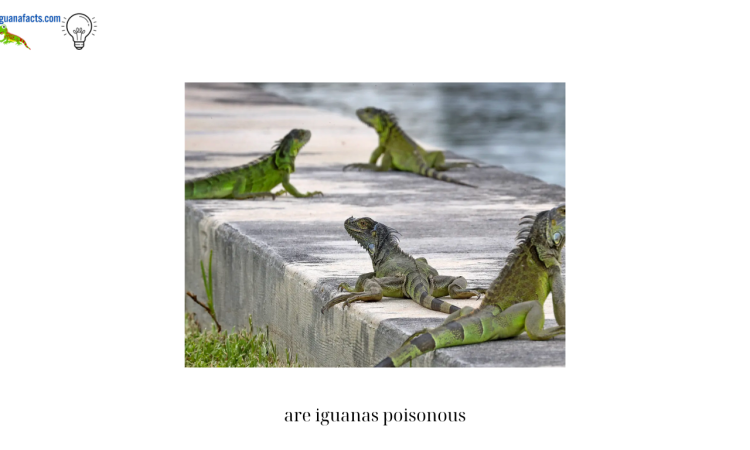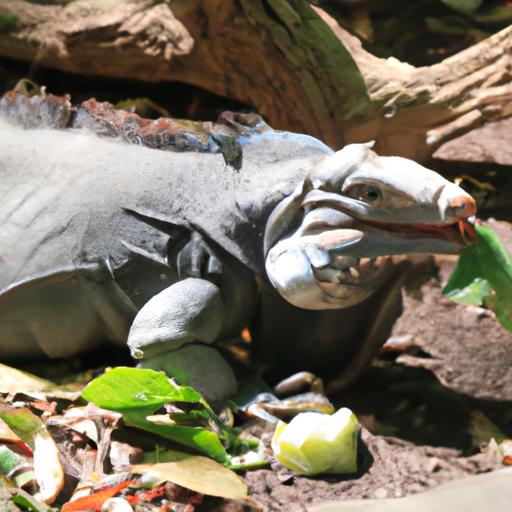Are Iguanas Poisonous? Exploring 10 Truth

Iguanas are fascinating creatures that captivate the curiosity of many people. As with any exotic animal, it’s natural to have questions and concerns about their potential dangers. One common question that arises is whether iguanas are poisonous. In this article, we will delve into this topic and explore ten truths about are iguanas poisonous. By understanding the facts, Iguanafacts can dispel any misconceptions and gain a better understanding of these reptiles.
Are Iguanas Poisonous? Exploring 10 Truth

Are iguanas poisonous? Iguanas are not poisonous animals. While they can carry bacteria and may exhibit defensive behaviors, their toxicity is a misconception. Understanding the facts about iguanas dispels any myths and allows us to appreciate these reptiles for what they truly are. Whether you encounter are iguanas poisonous, an iguana in the wild or choose to keep one as a pet, it’s important to practice responsible interaction and ensure the well-being of both the iguana and yourself. By respecting their natural habitats and adhering to proper hygiene practices, we can coexist with these intriguing creatures.
- Venomous vs. Poisonous:
Before diving into the specifics of are iguanas poisonous, it’s important to distinguish between venomous and poisonous. Venomous animals inject venom into their prey or predators, usually through bites or stings. On the other hand, poisonous animals are harmful when touched or consumed. When discussing iguanas, we are primarily concerned with their potential toxicity rather than venom. - Iguanas and Their Diet:
Are iguanas poisonous are primarily herbivorous, consuming a diet rich in leafy greens, fruits, and vegetables. Their diet consists of plant matter, which does not contain toxins or poisonous substances. As a result, iguanas do not possess any inherent toxicity through their diet. - Bacterial Contamination:
While iguanas themselves are not poisonous, it’s important to note that are iguanas poisonous and they can carry bacteria, such as Salmonella, which can cause illness in humans. The bacteria can be present in their feces and can be transmitted if proper hygiene practices are not followed after handling an iguana or their habitat. It’s crucial to wash hands thoroughly with soap and water after any contact with iguanas or their surroundings. - Defensive Mechanisms:
Iguanas have evolved various defensive mechanisms to protect themselves from predators. When threatened, they may lash out with their tails or bite if provoked. However, these defensive behaviors are not related to toxicity or venom. Understanding the facts about iguanas dispels any myths and allows us to appreciate these reptiles for what they truly are. Whether you encounter an iguana in the wild or choose to keep one as a pet, it’s important to practice responsible interaction and ensure the well-being of both the iguana and yourself.

- Bites and Infections:
While are iguanas poisonous iguana bites can be painful and potentially lead to infections if not properly cleaned and treated, they are not venomous. If you are bitten by an iguana, it’s crucial to clean the wound thoroughly and seek medical attention if necessary to prevent infection. - Skin Irritation:
Some individuals may experience skin irritation after coming into contact with iguanas or their shed skin. This irritation is typically caused by proteins present in their skin and is not a result of toxicity. - Allergies:
Although rare, some individuals may have allergies to iguanas or their shed skin that are iguanas poisonous. These allergies can manifest as respiratory symptoms or skin reactions. If you suspect an allergic reaction, it’s essential to consult a healthcare professional for proper diagnosis and guidance. - Toxin Accumulation:
While iguanas themselves are not toxic, it’s important to consider their environment. If an iguana lives in an area with toxic plants, such as those containing oxalates or other harmful substances, they may accumulate these toxins in their bodies. In such cases, the iguana’s flesh or organs can become toxic if consumed. However, this is a result of their environment rather than inherent toxicity. - Conservation Efforts:
Iguanas, particularly certain species like the blue iguana, are protected and endangered. It’s crucial to respect their natural habitats and refrain from capturing or keeping them as pets without proper authorization. Engaging in illegal activities related to iguanas can have legal consequences and negatively impact their populations. - Responsible Ownership:
If you choose to keep an iguana as a pet, it’s important to understand their care requirements. Ensuring a suitable habitat, a proper diet, and maintaining good hygiene practices are essential for the health and well-being of your pet iguana. Regular veterinary check-ups can also help detect any potential health issues.

Conclusion
In order to answer for the question are iguanas poisonous, the answer is that Iguanas are not poisonous animals. While they can carry bacteria and may exhibit defensive behaviors, their toxicity is a misconception. Understanding the facts about iguanas dispels any myths and allows us to appreciate these reptiles for what they truly are. Whether you encounter an iguana in the wild or choose to keep one as a pet, it’s important to practice responsible interaction and ensure the well-being of both the iguana and yourself. By respecting their natural habitats and adhering to proper hygiene practices, we can coexist with these intriguing creatures.




